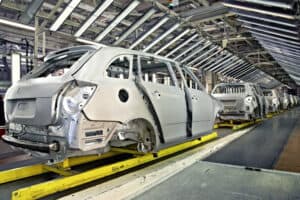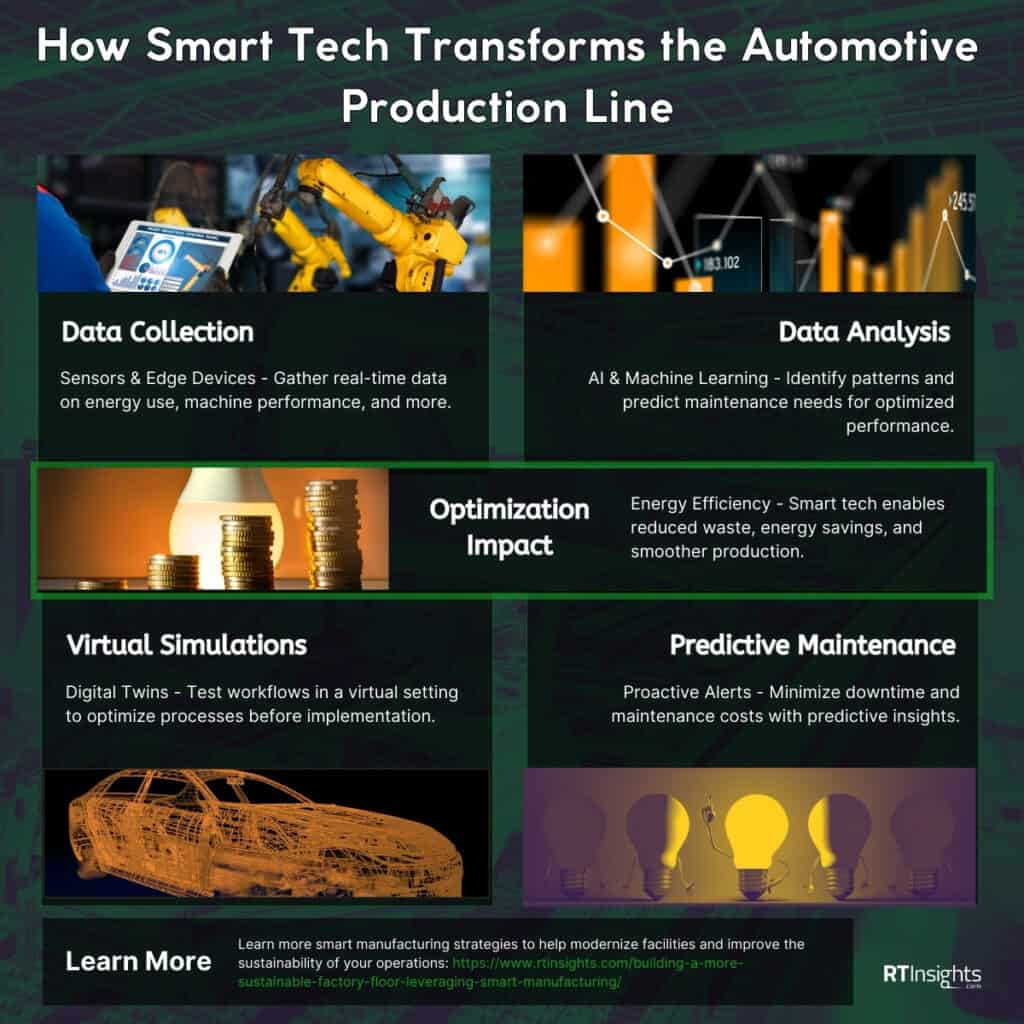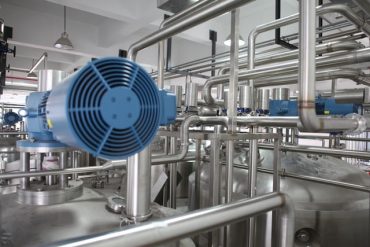
Auto manufacturers are adopting smart manufacturing strategies to modernize facilities and improve the sustainability of their operations.
Auto manufacturers are striving to reduce energy use, CO2 emissions, and waste and, in general, become more sustainable overall. Doing so not only benefits the manufacturer but also helps in two other ways. In particular, adopting a sustainability posture aligns with the desires of many of their customers who, being more aware of broader sustainability issues, are looking for companies with sustainability goals that match their own. And it helps the manufacturer meet the growing number of global government environmental regulations.
A few statistics about manufacturing industry energy use and waste put the issue into perspective:
- Industrial facilities use 33% of all energy used globally. Of that, 77% of all industrial electricity goes to manufacturing.
- One industry study found that the energy required to produce a typical passenger vehicle is 41.8 megajoules per kilogram (MJ/kg). The study puts that number into context, noting that it is about 40 times the energy used to run a household appliance like a washing machine.
- Waste is another matter. Between 2005 and 2022, waste generated in manufacturing cars went up by 32% per car.
Smart manufacturing technologies that can help
Energy is used in auto manufacturing plants to power production lines, weld parts, move materials and parts, metal forming, injection molding, and more. Energy is also required to extract raw materials, fabricate parts, and transport those parts and other materials to a production facility.
Smart manufacturing can help in several ways.
To start, auto manufacturers can modernize their existing plants by implementing smart technologies, such as edge devices and sensors, to collect data from the manufacturing line. That creates a source of information for advanced data analysis to drive performance optimization, monitor energy consumption, and drive predictive maintenance.
Complementing these technologies, an auto manufacturer can also make use of machine learning and AI to aid in the detection of anomalies and improve designs to reduce waste and energy use.
Other key technologies being used are virtual simulations and digital twins. Manufacturers can use them to design, run, and test operations in a controlled, virtual setting before moving them onto the shop floor. Additionally, digital twins give manufacturers more insight into how operations will function in the medium and long term. For example, they can do simulations to see how durable machines are and how often parts need to be repaired.
A subset of digital twin’s use is virtual commissioning. Here, a digital twin model of a machine, production line, or even an entire plant is used to optimize workflows before anything is built and deployed. Using this technology, an auto manufacturer can fine-tune processes, optimize movements, reduce downtime, and ensure that parts and materials are delivered to the assembly line when needed.
Getting deeper into the sustainability aspects of operations, an auto manufacturer can use the virtual models of its production line to simulate the environmental impact of its processes. Again, the manufacturer can use those models to change processes to reduce waste and energy usage.
Taken together, these smart technologies help an auto manufacturer optimize processes to maintain intelligent operations excellence.
See also: How Smart Technologies are Helping Simplify Sustainability in Auto Manufacturing
Multiplying the impact of smart manufacturing
Focusing on the production floor is just one area where smart manufacturing helps with respect to sustainability. Increasingly, smart technologies are being applied to things like supply chains and smart logistics.
With smart manufacturing, companies can track and analyze real-time data from across the supply chain. That helps them make more informed decisions about production, inventory management, and distribution.
Additionally, by leveraging IoT and real-time data, manufacturers can produce only what is needed, reducing overproduction and associated waste. And smart logistics can reduce transportation needs and optimize routes, leading to reduced fuel consumption and emissions.
A prime benefit of applying smart manufacturing technologies and methodologies to supply chains is it increases visibility into what’s happening. Having such real-time information improves the ability of auto manufacturers to make strategic, well-informed business decisions. They can more easily understand where waste occurs and how it can be minimized.

See also: Virtualizing the Automated Assembly Line
Working with a technology partner
Some core technologies needed to move to smart manufacturing, like IoT devices and smart sensors on the production floor, are well-known to auto manufacturers. But some of the more sophisticated technologies, like digital twins, AI, and machine learning, are not that widely used.
Auto manufacturers that want to embrace smart manufacturing and enjoy its benefits can hire staff knowledgeable in these areas and, over time, gradually build up the internal expertise needed to implement these technologies.
An alternative is to team with a technology partner that brings solutions, best practices, and deep industry expertise in using smart technologies in auto manufacturing. That’s where Siemens can help.
Siemens’ Smart Manufacturing Xcelerator portfolio gives automotive manufacturers the tools to implement intelligent manufacturing. It includes a comprehensive digital twin that enables companies to simulate manufacturing. And its closed-loop feedback capabilities offer predictive insights that can be used to fine-tune manufacturing and increase uptime to maximize profitability. All of this is essential when focusing on the sustainability aspects of auto manufacturing.
Additional Resources

Drive production excellence with intelligent manufacturing
The automotive industry is facing unprecedented challenges, with rapid change and intense pressure to meet the demands of climate change, regulations, and consumers. Download Now

Modernize automotive factories with Siemens Smart Manufacturing solutions
Discover how automakers can transform their business with Smart Manufacturing solutions using state-of-the-art hardware and software to modernize production lines. Watch Now

Virtual Manufacturing Development for the Automotive Industry
Companies in the automotive industry are pushing to develop the next generation of autonomous, electric, connected, and shared vehicles. View Now









